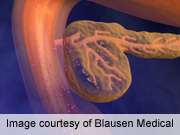Two patients diagnosed with a genetic form of non-insulin-dependent diabetes developed diabetic ketoacidosis years later, even though a history of diabetic ketoacidosis is normally an exclusion criterion for genetic testing, according to two case reports published online April 22 in Diabetes Care.
(HealthDay)—Two patients diagnosed with a genetic form of non-insulin-dependent diabetes developed diabetic ketoacidosis years later, even though a history of diabetic ketoacidosis is normally an exclusion criterion for genetic testing, according to two case reports published online April 22 in Diabetes Care.
Stepanka Pruhova, M.D., Ph.D., from Charles University in Prague and University Hospital Motol, and colleagues describe the cases of two unrelated patients aged 17 and 24 years who developed severe diabetic ketoacidosis several years after being diagnosed with hepatocyte nuclear factor-1A maturity-onset diabetes of the young (HNF1A-MODY). A history of diabetic ketoacidosis is currently an exclusion criterion for genetic testing for MODY, according to the authors.
The researchers note that both patients had poor metabolic control due to noncompliance and missed insulin injections. Diabetic ketoacidosis in both patients was associated with recurrent vomiting with dehydration and prerenal acute kidney injury. On admission, glycemia, blood pH, and base excess were 97 mmol/L, 6.80, and −33 mmol/L, respectively, for the first patient, and 34 mmol/L, 7.03, and −14 mmol/L, respectively, for the second patient.
"The two demonstrated cases of diabetic ketoacidosis in poorly controlled HNF1A-MODY may have implications for the need of adequate patient education and for individual assessment of the indication criteria for genetic testing because, although the molecular genetic diagnosis of MODY diabetes has direct implications for patient treatment, most cases of MODY remain misclassified," Pruhova and colleagues conclude.
More information:
Abstract
Full Text (subscription or payment may be required)
Journal information: Diabetes Care
Health News Copyright © 2013 HealthDay. All rights reserved.




















